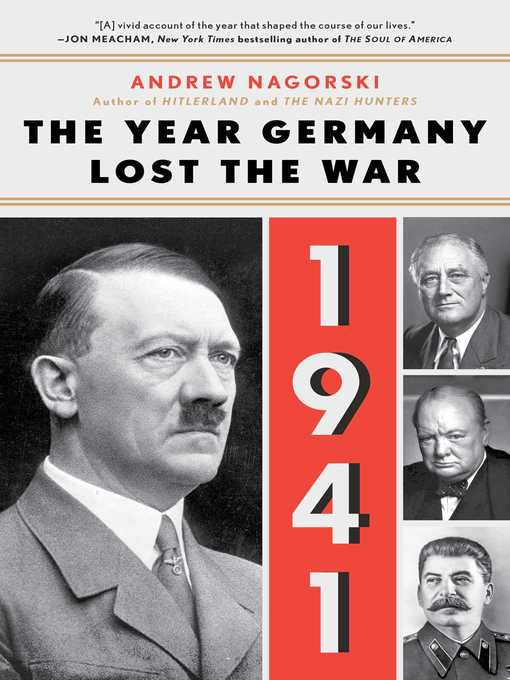
1941
The Year Germany Lost the War: The Year Germany Lost the War
کتاب های مرتبط
- اطلاعات
- نقد و بررسی
- دیدگاه کاربران
نقد و بررسی

April 1, 2019
A new history of a "decisive year" in World War II. Because Nazi Germany lacked the means to win a prolonged war, each year of the war could qualify as significant, but few readers will object to this expert history of 1941, a year when Hitler made a flurry of stupid decisions. Award-winning former Newsweek journalist Nagorski (The Nazi Hunters, 2017, etc.) emphasizes that when Hitler's advisers warned that his targets--France, Britain, and the Soviet Union--could mobilize much greater resources, he concluded, paradoxically, that Germany must go to war immediately while its military held the advantage. Conquering Poland in 1939 was relatively easy, but the 1940 defeat of France (considered the world's strongest military power) flabbergasted everyone and did nothing to discourage Hitler's megalomania. At the beginning of 1941, Germany had become massively powerful, and by spring, Winston Churchill's campaign to involve the United States was slowly advancing. President Franklin Roosevelt had revived the draft the previous fall. The Lend-Lease Act passed Congress in March, and the Destroyers-for-Bases agreement was finalized in September. Most readers will be surprised when Nagorski points out that Hitler's plan to invade the Soviet Union was no secret thanks to talkative Nazi officials and Soviet spies. Allied diplomats sent repeated warnings, but Stalin, as deluded as Hitler, dismissed them as capitalist disinformation. When the invasion began in June, everyone knew that the war had entered its critical phase, but it was winter before Allied leaders stopped worrying that the Soviet Union would collapse. Popular histories extol Allied lend-lease aid, but little arrived during 1941, so the Red Army pulled itself together on its own. The author ends with Hitler's bizarre declaration of war on America after Japan's December attack on Pearl Harbor. For much of the last half of the book, Nagorski concentrates on the Russian front, where over 90 percent of the fighting occurred, a figure that diminished only modestly in later years. Despite few revelations and though dominated by the immense war between two unsympathetic evil empires, this is a lively, opinionated account of a critical year.
COPYRIGHT(2019) Kirkus Reviews, ALL RIGHTS RESERVED.

May 1, 2019
In January 1941, Adolf Hitler's war machine seemed unstoppable. Yet by the end of the year, Germany was fighting a multi-front war against the Grand Alliance of the United States, the UK, and the Soviet Union. Germany's army was stalled outside of Moscow, engaged in a desperate fight in North Africa, and stretched thin in the Balkans. As historian Nagorski (The Nazi Hunters) adroitly notes, the creation of the Grand Alliance and the defeat of the Third Reich were not inevitable. While much of the narrative here focuses on the actions of Hitler, Joseph Stalin, Franklin D. Roosevelt, and Winston Churchill, Nagorski also introduces numerous secondary characters. Some, such as Charles Lindbergh, did all they could to prevent the alliance, while others, such as Ambassador John Winant, crafted the agreements that would ultimately help to win the war. VERDICT Nagorski's latest fits into recent scholarship that sees World War II as an influential turning point in history, beyond its significant battles, altering the course of the three nations involved in the Grand Alliance. While his thesis is not revolutionary, his study is well researched and will be of interest to a wide audience.--Frederic Krome, Univ. of Cincinnati Clermont Coll.
Copyright 2019 Library Journal, LLC Used with permission.

May 27, 2019
In this successful history, journalist Nagorski isolates 1941 as a turning point in world history, persuasively arguing it was the year Adolf Hitler’s political and military decisions ensured the downfall of the Third Reich. A year that began with the Soviet Union and Germany carving up occupied Poland, while British prime minister Winston Churchill tried to inveigle the United States to enter the war, ended with Russia, Britain, and the U.S. allied against Germany. As Nagorski recounts, 1941 was the year of “Germany’s attack on the whole world.” Hitler’s uneasy nonaggression pact with rival tyrant Josef Stalin came apart with the June 22 German invasion of the Soviet Union. Stalin ignored warnings of the attack from his generals, well-placed spies, and U.S. diplomats, nearly allowing Hitler’s prediction that a “swift victory over Russia was all but inevitable” to come true. Hitler, meanwhile, erred in committing to support Japan if it came to war with the U.S.; the December 7 attack on Pearl Harbor cemented a tripartite alliance that destroyed the Axis powers. Nagorksi’s strength is in piecing together political, diplomatic, and military narratives to create a cohesive whole. He’s a clear and lucid writer whose account of this pivotal year will please history buffs. Agent: Robert Gottlieb, Trident Media Group.

May 1, 2019
Nagorski, a longtime Newsweek correspondent and editor, offers a thoughtful analysis of a critical year in WWII, 1941, in which Germany went from the euphoria of triumph to catastrophic near-defeat. It was a year of dreadfully bad decisions: the invasion of Russia (Operation Barbarossa); the decision, after Pearl Harbor, to declare war on the U.S., which took America from an ostensible position of neutrality in Europe into alliance with Great Britain and Russia; the use of terrorism as an element of war; and the instigation of the Holocaust. All could have been anticipated, Nagorski asserts, by having read Hitler's Mein Kampf. Nagorski brings keen psychological insights into the world leaders involved (particularly Hitler and Stalin) and a striking awareness of Eastern European affairs. He points out convincingly that Stalin, as well as Hitler, harbored dangerous and self-destructive illusions, and he exposes both leaders' personal and tactical failings. He sometimes loses sight of his central thesis?a not-uncommon phenomenon when authors saddle themselves with overweening premises?but, nevertheless, this is solid history.(Reprinted with permission of Booklist, copyright 2019, American Library Association.)

























دیدگاه کاربران